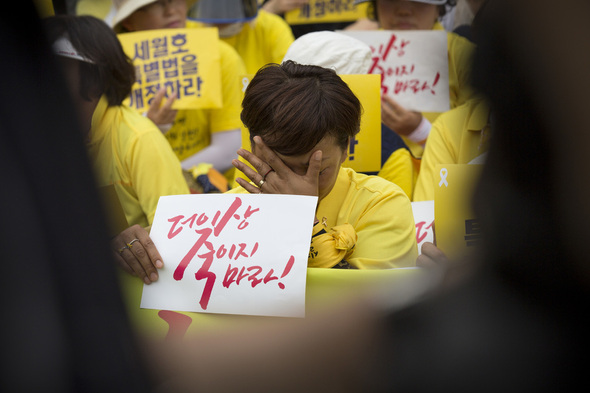Survey shows Sewol survivors and victims’ families still suffering
Survey shows Sewol survivors and victims’ families still suffering
#Sewol_tregidy #PTSD #still_suffering
 |
|
Kwon Mi-hwa, mother of Oh Young-seok, a Danwon High School student who died in the Sewol ferry sinking, wipes away a tear during a press conference in front of Cheongwoon Hyojadong Community Service Center near the Blue House, calling for the Sewol Special Investigative Commission to be strengthened, and condemning the Park Geun-hye government, June 27. The sign she’s holding reads, “No more deaths”. (by Kim Seong-gwang, staff photographer)
|
Many affected by physical and psychological symptoms related to trauma of sinking incomplete investigation
“Most of all, the family members . . . uh . . . all the parents want to let the children go. Huh. (sighs) I think it’s only after we know why the accident happened . . after when we’ve punished the people responsible . . . and prevented this kind of thing from happening again that the family members . . . uh . . . will let go of our children . . . as free souls.”(Excerpt from an interview with the father of a Danwon High School student who died in the 2014 Sewol ferry sinking) Over two years have passed since the Sewol ferry tragedy, yet a survey shows the survivors and family members of the victims are still suffering from psychological and physical problems in its wake.According to a draft report acquired of a survey by the special Sewol Investigative Commission on support for victims in the tragedy, the post-traumatic stress incidence rate for family members of Danwon High School students who lost their lives was 56%. The rate was much more severe than the 0.6% annual rate reported for the South Korean public as a whole.Family members were also found to be suffering from insomnia and other sleep disorders (75.4%) and physical stress-related symptoms such as headaches (72.7%).For the survey, in-depth interviews were conducted between January and June for groups among a total of 211 victims of the tragedy, including 145 family members of Danwon students who died in the sinking, 39 surviving students and their family members, and 27 non-student survivors and victim family members. The commission’s survey was the first conducted by a state organization for victims of a major disaster.“The aim was to assess and analyze problem areas and inadequacies in the victim support process in order to develop alternatives,” explained a commission source. The commission released the findings from the survey on July 20 at the Kim Koo Museum and Library in Seoul.The findings show sudden changes to the lives of family members of Danwon high school student victims as a result of the tragedy, including abandonment of jobs and changes in values. While 116 of those surveyed (81.3%) were working before the tragedy, 75 of them (64.6%) reported quitting work after the sinking. 42.6% reported contemplating suicide as a result of grief and subsequent trauma from losing children or siblings, while 4.3% reported actually making an attempt.“Early on after the tragedy, family members held on through will and determination, but as the investigation went on without any clear signs of process, their health has worsened as a result of the feeling of helplessness and doubt,” explained the research team of professor Cho Seon-mi from the Ajou University Industry-Academic Cooperation Foundation, which examined family members of Danwon student victims.“To heal from trauma, you need to go through stages of recovering stability through trust and restoring social relationships,” the team said. “Learning the truth about the Sewol is inevitably going to be a very important variable.”Survivors also showed difficulty overcoming the shock of the tragedy. Students from Danwon High School showed a particularly strong aversion to use of the term “rescue” during the interview process. In their perception, their survival was the result of an escape rather than a rescue.Surviving students also expressed anger over the Coast Guard’s rescue efforts.“If they’d gotten out the kids who were locked in their rooms, we would have all escaped,” said one.“There were still a lot of kids after me,” said another.“They didn’t go into the boat,” a third said.The research team of Korea University professor Kim Seung-seop, which examined surviving Danwon students and their family members, explained that they “have yet to overcome the shock of the tragedy because of survivors’ guilt.”“A lot of them were also hurt by sensationalist media reports about ‘preferential treatment’ in university admission,” the team said.With Danwon students accounting for the majority of victims, the results also showed that non-student survivors and victim family members felt hurt over the “insincere” attitude from government institutions and a sense of alienation owing to regional differences in support distribution.“We need a central government support system in place so that there aren’t regional differences in support to victims,” said Ewha Womans University professor Yang Ok-kyung, who looked into the question of how to support victims’ families and survivors.By Kim Mi-young, staff reporter
